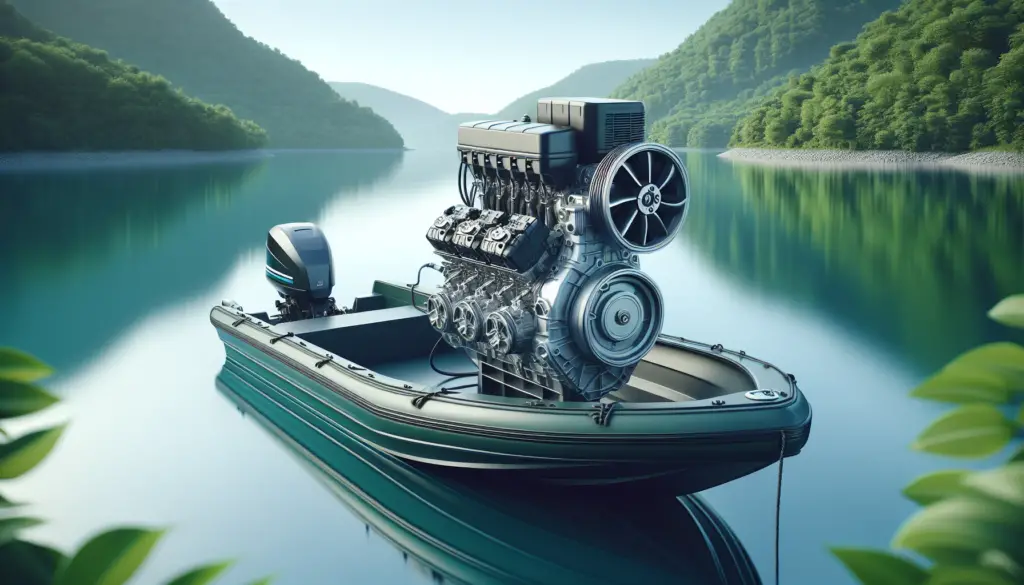Imagine a peaceful day out on the water with hardly a sound but the gentle lapping of waves against your hull. That serenity is just one of the advantages of electric boat engines, specifically designed for eco-friendly boating. This type of technology is not only better for the environment, but it also offers a plethora of advantages that go beyond just lowering carbon emissions. From improving air quality to decreasing noise pollution, prepare for an enlightening journey through the perks of powering your aquatic escapades with electric boat engines.

Understanding Electric Boat Engines
Boating is a popular pastime for many, but traditionally, it comes with a high environmental cost. Electric boat engines have emerged as an eco-friendly alternative that can dramatically decrease this impact.
What is an Electric Boat Engine?
Let’s begin with the basics. An electric boat engine is simply a motor that uses electricity as its power source, rather than gasoline or diesel. Just like in electric cars, the electricity is typically stored in a battery that you charge up when it runs low. Getting to know how to operate these engines might take some time, but trust me, it’s worth every effort.
Different types of Electric Boat Engines
There isn’t a “one size fits all” model when it comes to electric boat engines. They come in a range of types and sizes to suit different kinds of boats and water activities. Some of the more common types you might come across include outboard motors, inboard motors, and electric pod drives. But, as you dive deeper into the world of electric boating, you’ll discover even more variants designed to suit every kind of boat lover’s needs.
How do Electric Boat Engines work?
Electric boat engines work by converting electrical energy stored in the battery into mechanical energy that propels the boat. An electric motor is connected to the propeller shaft that, drive the propeller to rotate when powered. The power controller helps manage this whole process to ensure efficient operation and avoid overheating. It’s quite a simple and efficient process, saving you from the complexities that come with conventional engines.
Comparison between Electric and Conventional Boat Engines
There are several key differences between electric and conventional boat motors. One primary difference is their power source. As we’ve touched on, electric motors use stored electricity rather than combustible fuel. This leads to a host of benefits, which we will explore further in this article. These include lower emissions, less noise, and increased energy efficiency.
Energy Efficiency in Electric Boat Engines
Sustainability is where electric boat engines really shine. Their efficient use of energy is remarkable and makes them an excellent choice for the environmentally conscious.
Energy usage in Electric Boat Engines
Electric boat engines use electricity in a much more efficient way than conventional engines use fuel. The latter lose considerable energy in the form of heat due to inefficiencies in combustion. In contrast, electric engines can convert a higher percentage of the stored power into actual propulsion, resulting in less waste.
How Electric Boat Engines save energy
The energy efficiency of electric boat engines comes down to their design and operation. They don’t have the same range of moving parts as conventional engines, which reduces energy lost in friction. Furthermore, they can instantly adjust to changing demands for power, ensuring they only ever use as much energy as necessary.
Efficiency comparison: Electric vs Gas Boat Engines
When we compare the two, it becomes clear that electric boat engines are far more efficient than their gas counterparts. Gas engines are often less than 30% efficient, while electric ones can be over 90% efficient. This means that much more of your energy (and money) is going towards actually powering your boating adventures.
Long-term benefits of energy efficiency in boating
Energy efficiency in boating translates to a host of long-term benefits. For starters, it means saving money on fuel costs. Additionally, it can contribute significantly to mitigating climate change by reducing our overall energy consumption.

Emission Reduction with Electric Boat Engines
Beyond just saving energy, electric boat engines are also a major win for the environment thanks to their near-zero emissions.
Greenhouse Gas Emissions in Boating
Conventional boat engines, like cars, produce significant greenhouse gases when they burn fossil fuels. This contributes to climate change and local air pollution, leading to a host of negative environmental impacts.
How Electric Boat Engines Reduce Emissions
Electric boat engines generate zero emissions during operation, hence contributing significantly to air pollution reduction. Their impact on emissions extends beyond just the local level, as they also produce far less carbon footprints during the production phase.
Impact of Reduced Emissions on the Environment
Reduced emissions mean cleaner air, less climate change, and a healthier environment overall. For regions with many boats, such as popular fishing spots or tourist harbours, this could make a significant difference.
Legislation and Emissions Standards in Boating
In response to growing concerns about climate change and air pollution, many countries are implementing stricter emissions standards for boats. Switching to electric boat engines help boat owners to stay ahead of these regulations.
Noise Pollution Reduction
Noise pollution is a less visible but still important concern in boating. Here too, electric engines come out ahead.
Noise levels in Conventional Boating
Conventional boat engines can be quite loud, especially at higher speeds. This noise pollution can disturb the serenity of the waterfront and negatively impact marine life.
Noise reduction in Electric Boat Engines
Electric boat engines run much quieter than traditional ones. This means a more peaceful experience for you and less disturbance for the wildlife around.
The impact of noise reduction on marine life
Reduced noise pollution can have significant positive effects on marine life. Many aquatic animals rely on sound for communication, foraging, and navigation. By reducing the amount of noise we produce, we can help maintain these vital natural processes.
Human benefits of lower noise levels
Quieter operation also means a more enjoyable boating experience for you and your companions. It’s easier to have a conversation, listen to music, or simply enjoy the sounds of nature when you’re not competing with a roaring engine.

Water quality Improvement
Boating does not simply affect the air and noise levels. It has a significant consequence for water quality, too.
Effects of Boating on Water Quality
Conventional boating can have a negative impact on water quality. Fuel spills and emissions from boat engines can lead to water pollution, which harms aquatic life and spoils the natural beauty of our waterways.
How Electric Boats Improve Water Quality
Electric boats, due to their clean operation, do not release harmful substances into the water. No oil leaks, no fuel spills, nothing to contaminate the waterways.
Electronic Engines and Oil Spills
Since electric boat engines don’t require oil, there’s no chance of an oil spill. This greatly reduces their potential impact on water quality.
Impact of improved water quality
Improved water quality benefits both people and nature. It supports healthier aquatic ecosystems, cleaner beaches, and more enjoyable recreational water activities.
Battery Technology in Electric Boat Engines
Battery technology is crucial for the functionality and efficiency of electric boat engines.
Traditional vs. Electric Battery Technology
Traditional boat engines use a small battery to start the engine, whereas in an electric boat, a much larger, more sophisticated battery is used to power the motor. This is usually a lithium-ion battery, similar to what you might find in an electric car.
Evolution of Battery Technology for Electric Boats
Battery technology for electric boats has come a long way in the last few decades. The batteries today are far more efficient, reliable, and long-lasting than their precursors. They also require less maintenance, which is always good news!
The Life Cycle of Electric Boat Engine Batteries
The life cycle of a typical electric boat engine battery depends on its type and size, as well as how well it’s maintained. However, in general, electric boat batteries can last for many years before needing to be replaced.
Recycling and Disposal of Boat Engine Batteries
When an electric boat battery does eventually reach the end of its life, it’s important to dispose of it properly. Many parts of these batteries can be recycled, and doing so helps to reduce the environmental impact of your boating activities.

Maintenance Benefits of Electric Boat Engines
Maintenance is another area where electric boat engines have an edge over traditional ones.
Maintenance needs of Conventional Boat Engines
Conventional boat engines require regular maintenance to keep them running smoothly. This includes regular oil changes, filter replacements, and dealing with problems like corrosion and wear and tear.
Lower maintenance needs of Electric Boat Engines
In contrast, electric boat engines have far fewer moving parts and don’t require oil, which means there’s a lot less that can go wrong. As a result, they don’t need as much maintenance, saving you both time and money.
Cost savings from less maintenance
Over the lifetime of your boat, these savings on maintenance can add up. You’ll spend less on parts, less on servicing, and less time dealing with engine troubles.
Longer lifespan of Electric Boat Engines
Electric boat engines also tend to last longer than conventional ones, thanks to their straightforward, low-wear design. This means that not only do they require less maintenance, but they’re also likely to need replacing less often.
Economic Benefits of Electric Boat Engines
The benefits of electric boat engines aren’t just environmental. They can also make sense from an economic perspective.
Initial cost: Electric vs Conventional Boat Engines
While the initial purchase price of an electric boat engine can be higher than that of a conventional one, remember that this is just part of the story. When you take running costs into account, the picture often changes.
Long-term cost savings of using Electric Boat Engines
With lower fuel and maintenance costs, electric boat engines can end up saving you money in the long run. Depending on your boating habits, you might find that the savings start to outweigh the higher purchase price in a few years’ time.
The economic impact on the boating industry
Electric boat engines are also driving innovation and growth in the boating industry. They open up new markets and opportunities for creative strategies. It’s possible that we’re only just beginning to see the economic potential of this technology.
Government incentives for using electric technology in boating
As with electric vehicles, some governments are starting to offer incentives for people to go electric with their boats. These can be in the form of grants, tax breaks, or other financial benefits, and are another factor that can contribute to the economic appeal of electric boat engines.
Impact of Electric Boats on Marine Biodiversity
Marine biodiversity is another important consideration in boating. Electric boat engines can help to protect our aquatic ecosystems.
Effects of boating on marine life
Conventional boating can negatively impact marine life in various ways. Noise and water pollution can harm many species, and fast-moving boats can be a direct threat to animals such as manatees and turtles.
How Electric Boats affect Marine Biodiversity
By reducing noise and pollution, electric boats help to make waterways more hospitable for aquatic life. Additionally, because they produce no exhaust, they do not contribute to ocean acidification, one of the biggest threats to marine biodiversity.
Benefits of Electric Boats for eco-tourism
Electric boats offer a more sustainable choice for eco-tourism operators. They allow tourists to enjoy marine environments without disturbing them, which can help preserve these areas’ appeal and biodiversity.
Future prospects for enhancing marine biodiversity with electric boating technologies
As technology evolves and more people switch to electric boats, the benefits for marine biodiversity will only continue to grow. Perhaps one day, thanks to electric boating, our waterways, will be teeming with life once more.
Challenges and Solutions in Using Electric Boat Engines
While electric boat engines hold much promise, there are also challenges to overcome. Thankfully, solutions are being developed at an increasingly rapid pace.
Common challenges in using Electric Boat Engines
The most common challenges people face with electric boat engines include the initial purchase cost, range limitations, and the need to have a charging infrastructure. Although these are important concerns, many of them are being addressed as technology progresses.
Current solutions available
Solutions to these challenges are often not far off. Battery technology is improving, bringing the price down and improving range. At the same time, charging infrastructure is growing and becoming more accessible for boat operators.
Future technology advancements expected
In the near future, we can expect to see even more advances in electric boating technology. This could include more efficient batteries, faster charging, and perhaps even solar-powered boats.
Overcoming range anxiety in Electric Boating
Finally, it’s important to remember that range anxiety is often more perception than reality. The majority of boat trips are well within the range of modern electric boat engines, and strategic charging can ensure you never run out of power.
Taking the plunge into the world of electric boating can seem daunting at first. But, as we’ve discussed, the many benefits – from lower emissions and noise to cost savings and reduced maintenance – make it a worthy venture. With the continuous advancements in technology, the electric boating world keeps looking brighter. What a great time to consider the switch!

